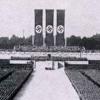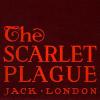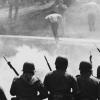Give Peace a Chance: Remembering John Lennon During Vietnam
Street Scribe

Photo Credit: Roy Kerwood
"April is the cruelest month," wrote poet T. S. Eliot, but as lyricist Ira Gershwin said, "It Ain't Necessarily So." In April of 1972, I made my first visit to New York City to attend the "Out Now" protest against the Vietnam War. April turned out to be a kind month for the organizers and participants in the demonstration, as some 50,000 people marched through the streets of the city in spite of cold and rainy weather.
The next morning's Apr. 23, 1972 edition of The New York Times carried a front-page story saying, "There was driving rain and biting cold, but still many thousands of people marched and rallied peacefully for hours on the city's streets yesterday to protest the war in Vietnam." The newspaper also mentioned that the multitude in the march stretched back for 20 blocks as it filled the streets and sidewalks of New York. Being in that movement multitude on my first trip to the City That Never Sleeps was a happy and heady experience that I will never forget.
We were a young and spirited crowd as we surged down Broadway and into the busy, bustling Avenue of the Americas. Thousands huddled in the rain, chanting and cheering the speakers at the rally, including longtime American dissident Dave Dellinger, actor Ossie Davis and Daniel Ellsberg, the man who exposed the Pentagon Papers during the war. Former congresswoman Jeanette Rankin told the crowd, "Never vote unless you are voting against war." All those speakers and more elicited loud cheers and applause from the thousands who were there that day, but the best was yet to come. Actor and event emcee Ben Gazarra turned to the teeming audience and announced that there would be a surprise, unscheduled guest: John Lennon. The crowd was ecstatic as the former Beatle and his wife Yoko Ono walked onto the stage. Thunderous applause and cheers from 50,000 voices drowned out the sounds of the city. I was lucky enough to be close to the stage as Lennon grabbed the microphone.
"You people are the only people who can stop this insane war," he shouted to the mass of humanity that clogged the city. Looking out on his oceanic audience that rallied in the rain, Lennon said, "It may be raining raindrops on you people, but it's raining bombs on Vietnam, so let's 'Give Peace a Chance!'" He then launched into his song that became an antiwar anthem as thousands of voices sang along to remind the world that "…all we are saying is give peace a chance." It was a cold, damp April day in New York in 1972, but with just one song, Lennon warmed the hearts and fired the spirits of those who were there when he sang his song of peace to a crowd that was filled with love.
I would return to New York as a journalist covering marches and rallies there in 1982 and 2004, but I will always cherish my memory of being in a rain-drenched but happy audience on my first trip to the Big Apple when John Lennon surprised us with song.
April was cold but kind in New York in 1972, and the sights and sounds of the peace rally there are with me to this day. Chants of "Out Now!" reverberated from canyons of buildings in the mighty city. A high-school band marched while playing Broadway showtunes. A man carried a protest placard saying, "Citizen Nixon, J'Accuse." Americans by the tens of thousands of every kind and from every state converged on New York from all across the nation to rally for peace.
The words of Lennon applied in 1972, and they apply now: "If someone thinks that peace and love are just a cliche that must have been left behind in the '60s, that's a problem. Peace and love are eternal." Lennon today would stand by his words of warning that he spoke before he was murdered in 1980: "Our society is run by insane people for insane objectives. I think we're being run by maniacs for maniacal ends."
Keywords
More by Ed Tant
-

Study Shows Pandemics Can Give Rise to Fascism
Street Scribe
-

Six Plague Page-Turners to Read During the Pandemic
Street Scribe
-










comments